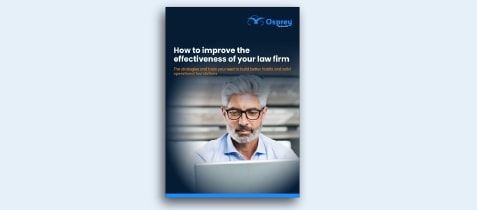Contents
Four business habits to help conveyancing firms achieve success
A recent survey by the Legal Services Consumer Panel has revealed that satisfaction levels among users of conveyancing services fell by 5% on the previous year to 88% in 2022. The research also found that the number of consumers shopping around for conveyancing services has this year risen to 48% (2021: 38%) – the biggest growth area compared to other legal services.

Chris Pucci, CEO of Osprey Approach, says that with more consumers willing to invest time in finding the right conveyancer, but fewer reporting a satisfactory outcome, it’s important that conveyancing firms “think carefully about how to attract and retain clients. It’ll be the quality of a firm’s client service that’ll set them apart from competitors – and ensure they receive five-star reviews and recommendations – not just the legal advice or price.”
Scott Bozinis, CEO of InfoTrack, agrees, and says that many conveyancing practices aren’t fully benefitting from technology’s potential to improve the client experience. “The software exists to help firms move faster, monitor, and meet deadlines, improve reporting, supervise teams more effectively, and directly improve the client’s onboarding experience. Embracing these solutions benefits law firms and their clients and can create a competitive advantage.”
Four effective business habits for conveyancing firms
In light of the Legal Services survey, Osprey Approach and InfoTrack have set out below four effective habits that conveyancing firms should adopt to help achieve long term success, as Pucci explains – “Without good operational, compliance, and client service habits in place, legal professionals are inflicting unnecessary restrictions on themselves, hindering their chances of meeting their goals, exceeding client expectations, or having a stress-free workload.
“Establishing good business habits will enable conveyancing firms to overcome the issues that are affecting the sector’s ability to progress. Such habits will provide the business with solid foundations and help them achieve long-term success.”
1. Think ‘digital-first’
All good habits stem from a successful digital-first strategy, which sets solid business foundations. Thinking digital-first is about adopting a concept known as Anywhere Operations, which ensures your business can operate, collaborate, and service clients without the reliance on physical locations, infrastructure, or processes, providing the ultimate flexibility and continuity.
There are several habits you can adopt to achieve an Anywhere Operations approach, including working primarily from your case and practice management solution (PCMS), communicating with clients via a web portal, and capturing and storing data digitally.
Bozinis points to InfoTrack’s ability to integrate with leading case management providers, which “removes admin-heavy conveyancing tasks, that can be automated within the case management system but without the need to re-key data. Firms can also complete digital services like creating a property report and submitting digital IDs; everything is contained in one system which reduces errors and improves efficiencies.”
2. Be client-focused
The success of any modern conveyancing firm relies heavily on the quality of your client service. A key benchmark of the value provided to clients is how timely, convenient, and personal the service is.
Digitally onboarding new clients helps to ensure that you deliver an exceptional client service easily and effectively from the initial client enquiry, through to the signing of contracts.
Implementing a range of digital client-focused habits such as electronic signatures for documents, digital ID verification, and a secure client portal that provides real time updates, will reduce friction in your clients’ experiences and help you win, and retain, new business, as well as compete with larger firms, who 54% of SMEs believe are their biggest threat.
3. Continuous improvement
To run a continually effective operation, your firm’s fundamental processes need to be reviewed so habits don’t become stale and inefficient. When a task becomes a habit, it can easily be over-looked and possibly ineffective, since technology, clients, and goals change. Having a continuous improvement mindset will ensure your firm is constantly seeking the best outcome.
To facilitate a continuous improvement mindset, you first need to document existing processes and habits, which will enable you to identify current challenges and areas for improvements, whilst highlighting how tech can enhance each process. For instance, has your firm prepared for the mandatory switch to digital AP1s, which is a matter of weeks away?
The associated habits you’ll need to adopt include scheduling regular firm-wide updates to ensure your conveyancing team is on board; encouraging ideas for improvements; and monitoring how these efforts have impacted your overall goals using the data from your PCMS.
4. Empower employees
76% of SME firms believe recruitment challenges pose the biggest impact to their business strategy and that’s certainly true for the conveyancing sector. As one of the biggest investments you’ll make for your business, look to empower your team with the right digital tools and freedom to grow to be a successful modern law firm that will attract the best talent.
Some of the habits you’ll need to achieve success in this area include implementing regular one-to-one time with the team to provide a safe space for feedback and discussion, scheduling time for training – well in advance – and arming staff with the digital tools required to do their job effectively.
Technology facilitates better business habits
Regardless of your firm’s goals, practice, and case management software, along with complementary integrations, provide the digital tools and centralised platform to implement effective business habits. With the fundamentals and essentials running smoothly with legal tech, you and your team can focus on driving the firm forward.
To succeed as a modern law firm in an increasingly competitive market, you’ll need to adopt and implement efficient digital, tech-driven habits that help to improve profitability, empower employees, and deliver quality client care.
Discover more advice and best practices on implementing the four fundamental habits in our Build Better Habits webinar series. View all four episodes now.




